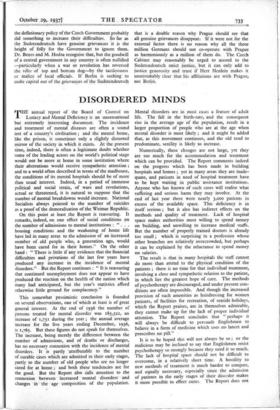DISORDERED MINDS
THE annual report of the Board of Control on Lunacy and Mental Deficiency is an unsensational but extremely interesting document. The incidence and treatment of mental diseases are often a sound test of a country's civilisation ; and the mental home, like the prison, is sometimes only a slightly distorted mirror of the society in which it exism At the present time, indeed, there is often a legitimate doubt whether some of the leading actors on the world's political stage would not be more at home in some institution where their aberrations would receive sympathetic attention ; and to a world often described in terms of the madhouse, the conditions of its mental hospitals should be of more than usual interest. Indeed, in a period of immense political and social strain, of wars and revolutions, actual or threatened, it is natural to suppose that the number of mental breakdowns would increase. National Socialists always pointed to the number of suicides as a proof of the demoralisation of the Weimar Republic.
On this point at least .the Report is reassuring. It remarks, indeed, on one effect of social conditions on the number of admissions to mental institutions : " . . • housing conditions and the weakening of home life have led in many areas to the admission of an increased number of old people who, a generation ago, would have been cared for in their homes." On the other hand : " There is little if any evidence that the financial difficulties and privations of the last few years have produced any increase in the incidence of mental disorders." But the Report continues : " It is reassuring that continued unemployment does not appear to have produced the reaction on the health of the nation which many had anticipated, but the year's statistics afford otherwise little ground for complacency."
This somewhat pessimistic conclusion is founded on several observations, one of which at least is of great general interest. At the end of 1936 the number of persons treated for mental disorder was 185,522, an increase of 1,751 during the year ; the annual average increase for the five years ending December, 1936, is 1,765. But these figures do not speak for themselves. The increase, being merely the difference between the number of admissions, and of deaths or discharges, has no necessary connexion with the incidence of mental disorders. It is partly attributable to the number of curable cases which are admitted in their early stages, partly to the number of old people who are no longer cared for at home ; and both these tendencies are for the good. But the Report also calls attention to the connexion between increased mental disorders' and changes in the age composition of the population. Mental disorders are in most cases a feature of adult life. The fall in the birth-rate, and the consequent rise in the average age of the population, result in a larger proportion of people who are at the age when mental disorder is most likely ; and it might be added that, as this movement continues, and the old tend to predominate, senility is likely to increase.
Numerically, these changes are not large, yet they are too much for the accommodation and treatment which can be provided. The Report comments indeed on the progress which has been made in building hospitals and homes ; yet in many areas they are inade- quate, and patients in need of hospital treatment have to be kept waiting in public *assistance institutions. Anyone who has known of such cases will realise what suffering and serious harm they may involve. At the end of last year there were nearly 3,000 patients in excess of the available space. This deficiency is in itself serious ; but it also has indirect effects on the methods and quality of treatment. Lack of hospital space makes authorities most willing to spend money on building, and unwilling to increase medical staffs. But the number of properly trained doctors is already too small ; which is surprising in a profession whose other branches are relatively overcrowded, but perhaps it can be explained by the reluctance to spend money on salaries.
The result is that in many hospitals the staff cannot do more than attend to the physical condition of the patients ; there is no time for that individual treatment, involving a close and sympathetic relation to the patient, in which lies the greatest hope of cure. The methods of psychotherapy are discouraged, and under present con- ditions are often impossible. And though the increased provision of such amenities as hairdressing for women patients, of facilities for recreation, of seaside holidays, which the Report praises, are in themselves admirable, they cannot make up for the lack of proper individual attention. The Report concludes that " perhaps it will always be difficult to persuade Englishmen to believe in a form of medicine which uses no lancet and prescribes no pill." - It is to be hoped this will not always be so ; or the malicious may be inclined to say that Englishmen resist psychotherapy so strongly because they need it so much. The lack of hospital space should not be difficult to overcome, in a relatively short time. A hostility to new methods of treatment is much harder to conquer, and equally necessary, especially since the admission of patients in the early stages of their disorder makes it more possible to effect cures. The Report does not say whether its criticisms apply as much to private as to public institutions ; many, perhaps unjustly, will sus- pect that they have even more serious failings, and it would be valuable if this suspicion could be either overcome or confirmed by official enquiry. For some patients, in private and public institutions, the senile or the mentally defective, there may be no hope of cure ; others, especially the young, differ from their normal fellows by only a narrow margin and with proper treatment that difference can be removed. It is essential that, for them, entering a mental home should be, not a con- demnation to perpetual imprisonment, but a promise of a better future ; and modern methods of treatment will allow this promise to be fulfilled.



























































 Previous page
Previous page